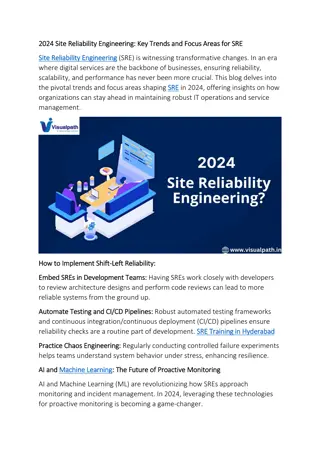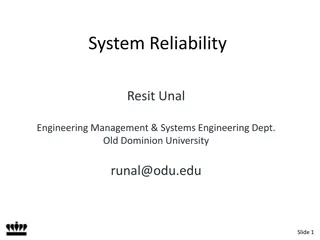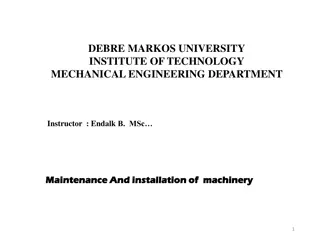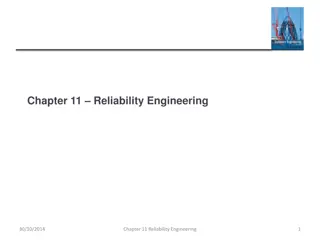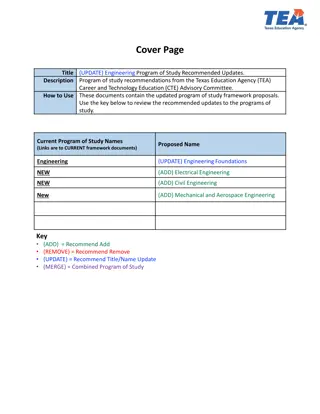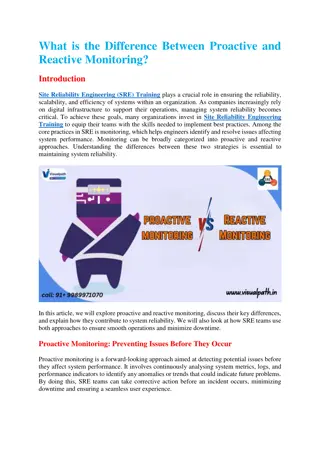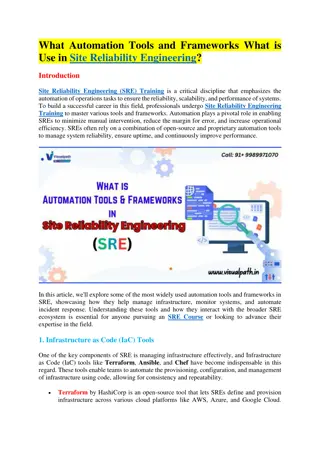
Site Reliability Engineering Online Training - SRE Course
Join Visualpath for a comprehensive Site Reliability Engineering Training led by industry professionals. Our program includes hands-on projects, real-world scenarios, and interview preparation to help you excel in your SRE career. Access the SRE Course from India, the USA, the UK, Canada, Dubai, and Australia. To schedule a free demo, call 91-9989971070 todaynKey PointsnPrometheus, Grafana, Datadog, ELK Stack, Ansible, Terraform, Apache JMeter,nWhatsApp: // /catalog/919989971070/nVisit: // /online-site-reliability-engineering-training.html
Uploaded on | 2 Views
Download Presentation

Please find below an Image/Link to download the presentation.
The content on the website is provided AS IS for your information and personal use only. It may not be sold, licensed, or shared on other websites without obtaining consent from the author. If you encounter any issues during the download, it is possible that the publisher has removed the file from their server.
You are allowed to download the files provided on this website for personal or commercial use, subject to the condition that they are used lawfully. All files are the property of their respective owners.
The content on the website is provided AS IS for your information and personal use only. It may not be sold, licensed, or shared on other websites without obtaining consent from the author.
E N D
Presentation Transcript
Site Reliability Engineering Training: What is Chaos Engineering, how is it Relevant to SRE? Introduction: Site Reliability Engineering (SRE) Training is a discipline focused on maintaining the reliability, scalability, and efficiency of systems. As businesses move toward cloud-native architectures, ensuring system resilience becomes increasingly crucial. Many organizations now incorporate Chaos Engineering as part of their Site Reliability Engineering Training to prepare teams for real-world failures. Chaos Engineering is a practice that involves intentionally injecting faults into a system to test its reliability and identify weaknesses. This proactive approach complements the skills learned in an SRE course by preparing engineers to handle incidents in real time and under high pressure. Chaos Engineering plays a key role in identifying potential failure points before they cause significant outages. The traditional approach of reactive maintenance fixing problems after they occur is not sufficient for today's high-demand systems. In a well-structured Site Reliability Engineering Training program, Chaos Engineering helps engineers develop a mind- set that prioritizes resilience. Teams can observe how systems react to unexpected issues such as network partitions, server crashes, or database failures, and apply fixes before they become catastrophic. This hands-on learning is an integral part of any comprehensive SRE Course, providing teams with tools to not only detect but prevent large-scale disruptions. In practice, Chaos Engineering often employs tools like Chaos Monkey and Chaos Toolkit, which simulate real-world failures. The goal is to uncover hidden weaknesses in the infrastructure that normal testing might miss. This is particularly useful in complex, distributed systems where pinpointing failure modes can be challenging. Chaos Engineering aligns closely with SRE principles, as both emphasize automation, monitoring, and continuous improvement. For engineers pursuing Site Reliability Engineering Training, these practical exercises allow
them to improve their problem-solving abilities and deepen their understanding of system design. The Relevance of Chaos Engineering to SRE Course The relevance of Chaos Engineering to SRE cannot be overstated. A key element of SRE is maintaining service reliability through automation and efficient operational management. Chaos Engineering helps identify weak points in a system s architecture, which can then be addressed to ensure long-term reliability. In most SRE Course modules, there is a strong focus on this aspect of reliability testing. Engineers are trained to implement controlled experiments, where systems are deliberately pushed to fail in order to see how they recover. These experiments provide critical insights into system behavior. Chaos Engineering encourages teams to prepare for the worst-case scenarios in real-world conditions, which enhances their ability to maintain high availability and meet Service Level Objectives (SLOs). For example, engineers undergoing Site Reliability Engineering Training are taught to design redundant systems that can withstand failures without affecting end users. The iterative learning process from these experiments also feeds into post-incident reviews, leading to continuous improvement in both system architecture and operational practices. Chaos Engineering fits well within the broader scope of SRE because it supports one of its core tenets: reducing manual intervention in complex systems. By automating failure tests and observing results, SRE teams can focus on optimizing performance and scalability without being overwhelmed by unexpected outages. This integration of Chaos Engineering into daily SRE practices equips engineers with the foresight to anticipate and resolve issues before they spiral into major incidents, ensuring more resilient and reliable services. Conclusion Chaos Engineering has become an essential practice in Site Reliability Engineering (SRE), contributing significantly to the training and development of engineers in the field. By introducing controlled failures and experimenting with system resilience, Chaos Engineering helps engineers detect vulnerabilities before they manifest into larger problems. It enhances the concepts taught in Site Reliability Engineering Training and SRE Courses, ensuring that teams are well-prepared to handle complex system issues with confidence. As organizations increasingly adopt cloud-based and distributed systems, the role of Chaos Engineering will only grow in importance, reinforcing its relevance to the future of SRE. Visualpath is the Best Software Online Training Institute in Hyderabad. Avail complete Site Reliability Engineeringworldwide. You will get the best course at an affordable cost. Attend Free Demo Call on - +91-9989971070.
WhatsApp: https://www.whatsapp.com/catalog/917032290546/ Visit:https://www.visualpath.in/online-site-reliability-engineering-training.html



